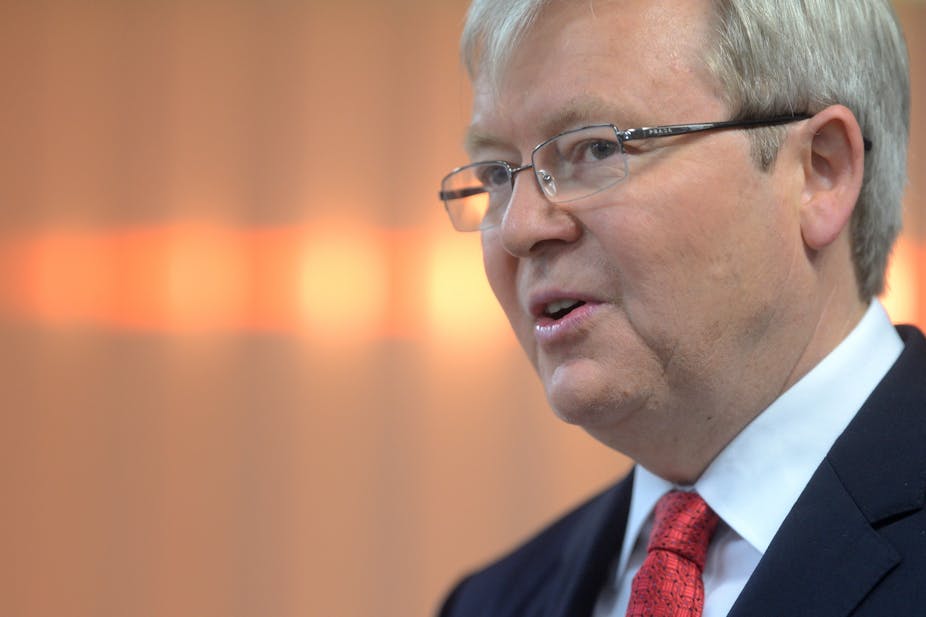It’s hard to imagine how things could have looked much worse for Labor this week. Kevin Rudd’s attack on Tony Abbott’s paid parental leave scheme might be working – and how funny is that? – and the undecided voters gave him the debate. But mostly, he seemed to be struggling, jumping all over the place.
His talk of the fast train and relocating Navy ships appeared little more than journeys over the horizon. His claim Abbott had an unsuitable “temperament” to deal with a foreign crisis such as Syria had a touch of desperation (while he himself was very gung ho).
His expressed concern during Wednesday’s Rooty Hill debate about foreigners getting too much Australian land may be a pitch to Bob Katter’s voters but if so he should have explained it to his ministers.
He said yesterday he stuck by his comments, describing himself as a “economic nationalist” but also said “I was simply stating my overall preference which is that we have joint ventures”. This left it unclear whether he had been saying anything significant on Wednesday or nothing at all. Colleagues didn’t seem to have much of a clue what he was talking about in policy terms. Finance minister Penny Wong, ever on message as campaign spokeswoman, found she didn’t have a message to be on.
But other problems paled beside the costings rebuff from top public servants late yesterday. Labor’s hope has been to frighten the electorate about Abbott’s “cut, cut, cut” intentions, which requires discrediting the Coalition’s figures.
So when the opposition produced savings totalling $31.6 billion, the government quickly found a hole, which it said was $10 billion. This is a familiar script in campaigns, although in this one, there is not much evidence the public is taking fright at the scare (Essential polling found people expect whoever wins to produce fresh cuts).
The government relied for its hatchet job on costings it had got done before the election was called. But when the secretaries of Treasury and Finance and the head of the Parliamentary Budget Office issued statements making it clear they hadn’t costed opposition policies (only the government’s version of them) and that a whole lot of things could be different, suddenly Labor not only lost an attack weapon but was heavily on the defensive for tricky behaviour.
With just over as fortnight to go, Rudd optimists say that past elections show the polls can move two or three points in that time (either way). “Are we dead? No”, says one, while admitting, “We’re coughing up a fair bit of blood.”
But the majority feeling on both sides is that Abbott has victory in the bag. Daughter Louise, who works in Switzerland, is returning for election day, no doubt expecting to watch Dad’s triumph.
Rudd himself, however, draws public heart from a couple of pieces of history: a horse race and the 1993 election. “Someone told me a few days ago it’s 150, 160 Melbourne Cups – the favourite has won 35 times”, he told journalists yesterday. And then he reminded them of 1993 when John Hewson “was the favourite and regarded as a shoo-in. Well, that’s Mr Abbott’s attitude today”.
Only up to a point. Abbott worked for Hewson at the time and is seared by the memory of an election that turned more silently than most realised until it was all over.
At the moment Labor’s polling numbers suggest a loss of about 15 seats, with NSW likely to be a rout and Tasmania expected to see casualties while Queensland has stabilised. Despite the strong Liberal campaign in Rudd’s seat of Griffith, the ALP expects to retain it.
The Labor campaign organisation is performing better than earlier, with more power going back to ALP national secretary George Wright; members of the Rudd entourage, the hubris of the early days faded, are said to be better team players than they were.
Labor has forced bipartisanship on the boats; the Liberals have cuddled up to Labor on education and health. When Abbott found himself slightly exposed on Medicare Locals during Wednesday’s debate he declared that he wasn’t planning to close any of them. This was a touch impetuous – yesterday he had to say they would not necessarily all “stay exactly the same”.
But economic management remains a key defining issue in the campaign, and the Liberals retain their superiority. In the Labor camp they muse on how a Triple A rating can be accompanied by such a negative rating by the voters.
One wonders whether the way Rudd and his ministers stick to their claim that the Coalition has a $70 billion funding gap – when fact checkers and leading economist Saul Eslake have discredited the number - is just counterproductive for Labor. The ALP is working on the principle that if you say it often enough, people will buy it. It’s also so locked into the claim that retreat has become impossible.
But people are so disillusioned, indeed disgusted, with politics after the last three years that politicians who make exaggerated and clearly false claims are just likely to further alienate them. Voters (or at least enough of them) know when they are being treated with cynical disrespect and they give back the treatment in spades.
At the end of week four, the question on the Liberal side is how big a majority the Coalition can get – because size will matter – while for Labor it’s how much “furniture” Rudd can save. And remember, when caucus members were considering reinstating him, it was all about the furniture, rather than victory.

